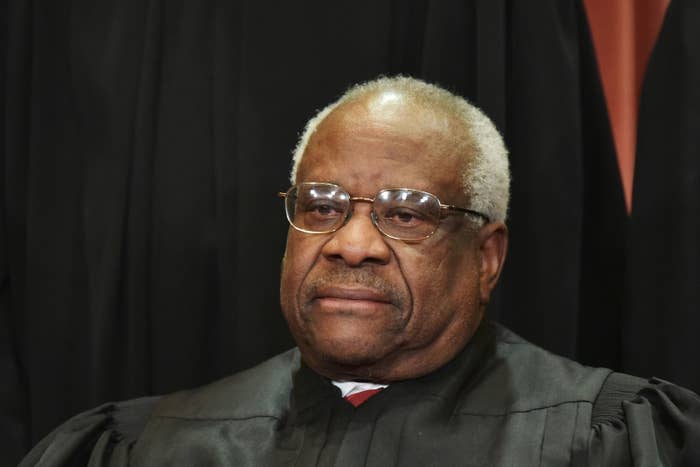
WASHINGTON — The US Supreme Court declined to rule Tuesday on an Indiana law banning abortions due to race, sex, or disability, but Justice Clarence Thomas made clear he'd support it, writing that he believed there were already signs abortion was being used to "achieve eugenic goals."
The Indiana law — which Vice President Mike Pence signed in March 2016 when he was still governor — will not take effect now. A federal appeals court blocked it, and the Supreme Court explained on Tuesday that the justices would wait to consider whether laws such as Indiana's were lawful until more appeals courts weighed in. That leaves the original appeals court decision in place for now.
In a separate, 20-page opinion, however, Thomas telegraphed where he'd land if the court does take up the subject in the future. He drew a line between the eugenics movement of the early 20th century — which embraced the idea that black people, other minorities, and individuals with disabilities were inferior and that steps should be taken to reduce their populations — and the fight to increase women's access to birth control and abortion.
"Enshrining a constitutional right to an abortion based solely on the race, sex, or disability of an unborn child, as Planned Parenthood advocates, would constitutionalize the views of the 20th-century eugenics movement," Thomas wrote.
It's no secret Thomas is opposed to abortion. But as fights over state abortion restrictions trickle up through federal courts across the country — a fight that anti-abortion advocates have said is aimed at getting the Supreme Court to reconsider Roe v. Wade, which established a right to abortion — Thomas's opinion Tuesday illustrated the lens through which he views abortion, and sources he's found persuasive in shaping that outlook.
Thomas bounced back and forth between discussing birth control and abortion in the context of eugenics, while acknowledging that they raise different issues. He quoted Planned Parenthood founder Margaret Sanger, who wrote in the early 20th century about how the eugenics movement could embrace birth control to serve its purposes and shape the population. Thomas acknowledged Sanger wasn't talking about abortion, but he wrote that her arguments could also apply to abortion. To support the position that eugenics supporters embraced abortion, Thomas largely cited writings from the 1930s and 1960s.
As for race, Thomas noted that a US government study found that black women had higher abortion rates than white women, but he didn't delve into the reasons.
The Supreme Court on Tuesday also ruled on another section of the Indiana law that restricts how abortion providers dispose of fetal remains. The court allowed that law to take effect. In a per curiam decision, which means the court didn't specify how each justice voted, a majority of the court found that the US Court of Appeals for the 7th Circuit applied too high a standard in reviewing the restrictions — Indiana demonstrated that the law was "rationally related" to the state's interest in how fetal remains were disposed, the court wrote.
Justices Ruth Bader Ginsburg and Sonia Sotomayor dissented, making clear they would have left the 7th Circuit's decision intact.
Indiana Attorney General Curtis Hill said in a statement: "The highest court in the land has now affirmed that nothing in the Constitution prohibits states from requiring abortion clinics to provide an element of basic human dignity in disposing of the fetuses they abort."
Reproductive rights groups decried the ruling, saying it was part of a pattern of state laws aimed at making it harder for abortion providers to operate and, as a result, making it harder for women to obtain the procedure.
“Today the Court let another unwarranted restriction on abortion stand. While this ruling is limited, the law is part of a larger trend of state laws designed to stigmatize and drive abortion care out of reach. Whether it’s a total ban or a law designed to shut down clinics, politicians are lining up to decimate access to abortion," Jennifer Dalven, director of the ACLU's Reproductive Freedom Project, said in a statement.
As for the prohibition on abortions "solely" based on a fetus's race, sex, or disability status, the court found it was too soon to rule. The 7th Circuit was the only federal appeals court to tackle the issue so far, and the justices said they would wait to see what other circuits did if confronted with similar state laws. It's routine for the Supreme Court to sit on an issue to gauge if there's disagreement among the lower courts before stepping in.
Thomas wrote that he agreed with the court's decision to wait, but nevertheless also wanted to make clear that he believed laws such as Indiana's "promote a State's compelling interest in preventing abortion from becoming a tool of modern-day eugenics." No other justice joined his concurring opinion, so it's not clear how his colleagues feel about his position.
In writing that Iceland, other European countries, and the United States had high abortion rates for fetuses diagnosed with Down syndrome, Thomas cited an op-ed written by conservative Washington Post columnist George Will, as well as a 2012 article that reviewed studies on pregnancy termination data. Will's piece didn't specify the source of his data. Thomas also pointed to articles about the prevalence in Asia for sex-selective abortions favoring boys — National Asian Pacific American Women's Forum Executive Director Sung Yeon Choimorrow released a statement saying Thomas's comments "promote dangerous, false stereotypes" about Asian American and Pacific Islander women.
"Technological advances have only heightened the eugenic potential for abortion, as abortion can now be used to eliminate children with unwanted characteristics, such as a particular sex or disability. Given the potential for abortion to become a tool of eugenic manipulation, the Court will soon need to confront the constitutionality of laws like Indiana’s," Thomas wrote.

